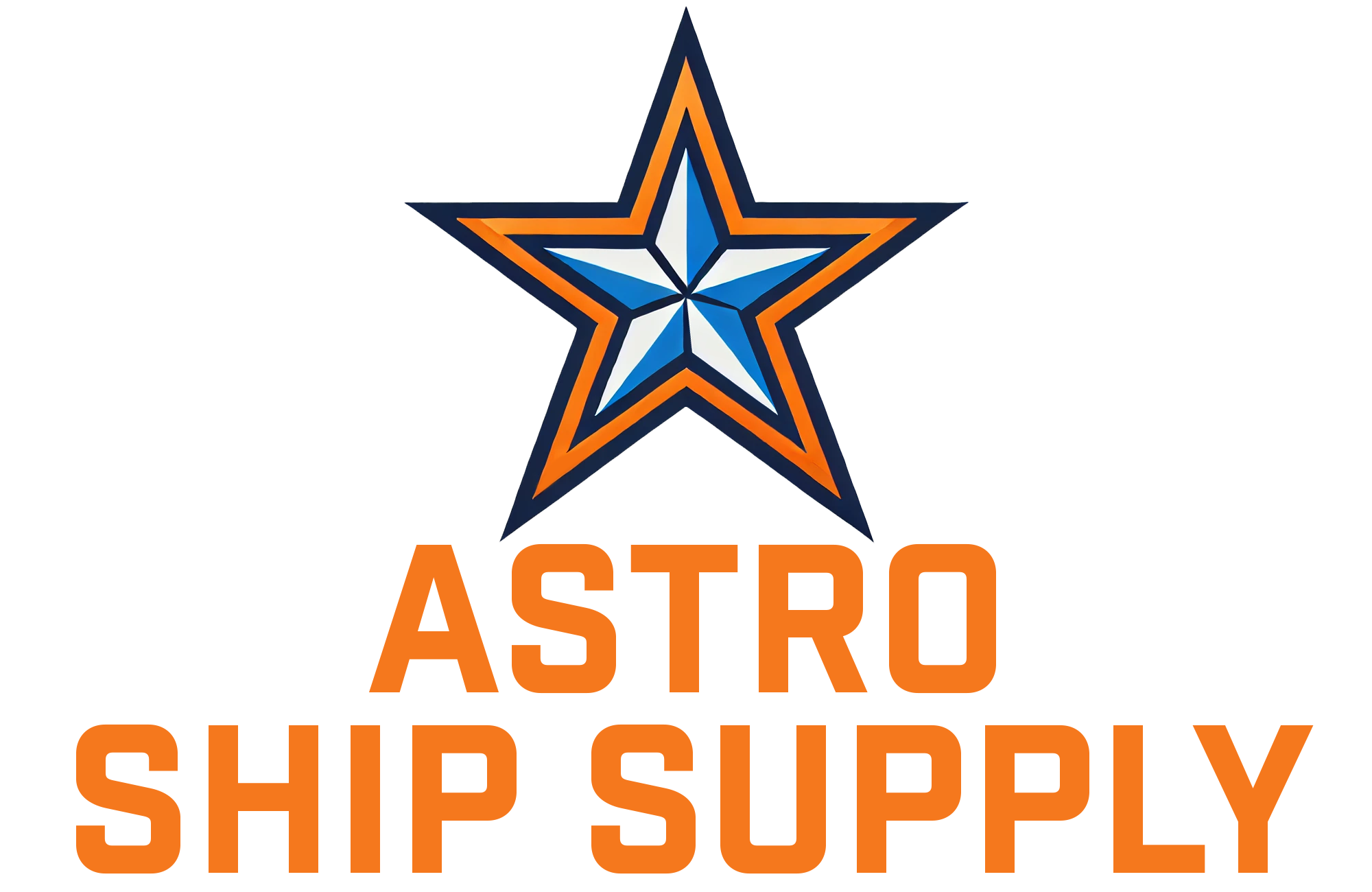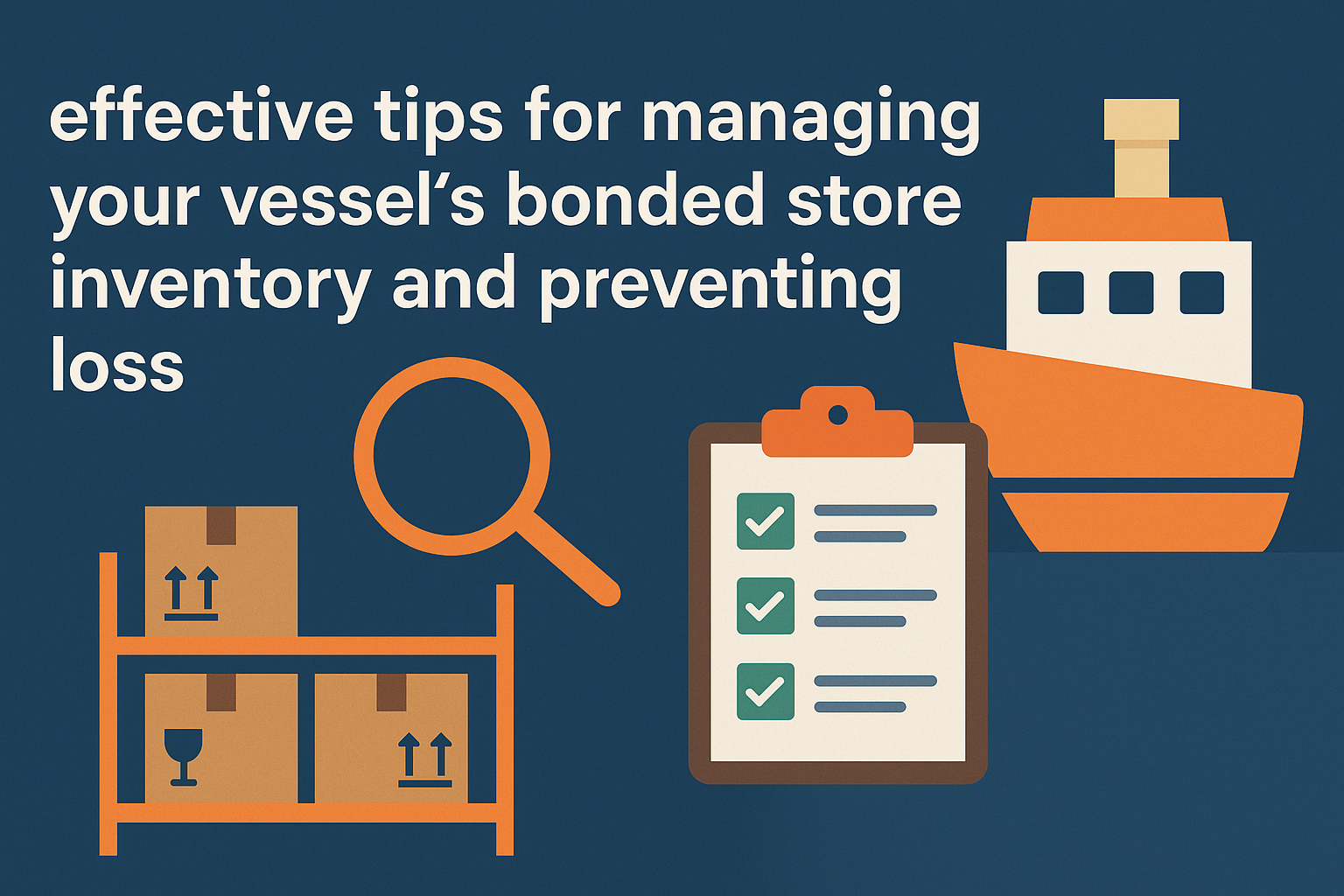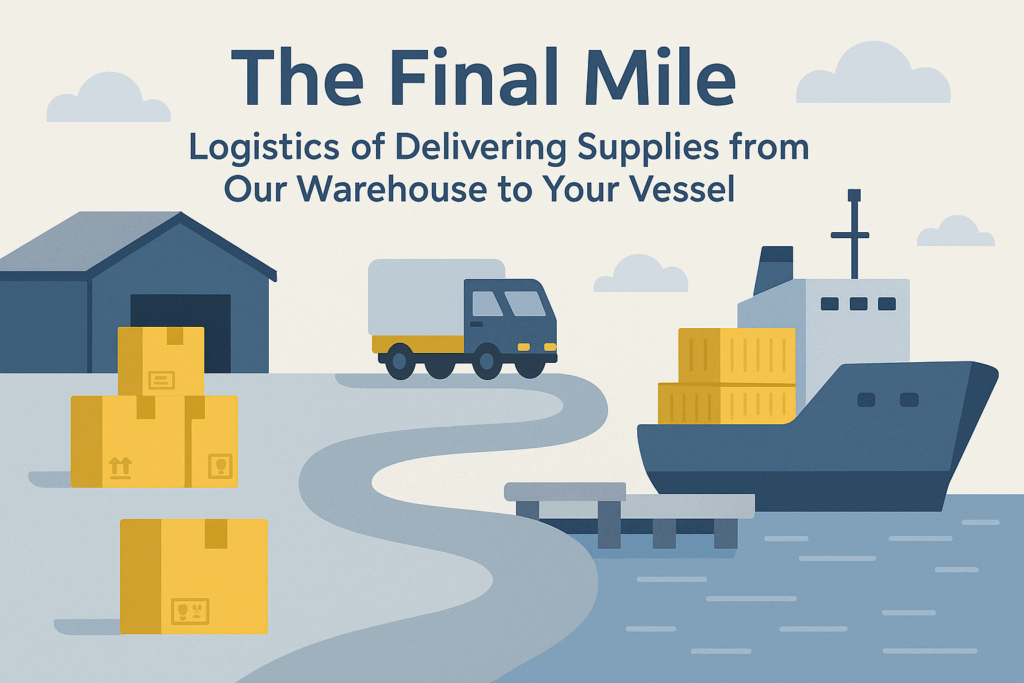Unlocking Efficiency: Expert Tips for Managing Your Vessel’s Bonded Store Inventory and Preventing Loss
A ship’s bonded store is a unique entity onboard – a carefully curated selection of duty-free goods ranging from tobacco and spirits to confectionery and electronics, all existing in a tightly regulated space. Effectively managing this inventory presents a dual challenge: ensuring crew access to morale-boosting comforts while maintaining strict control to prevent financial loss and navigate complex customs regulations. Mismanagement can quickly lead to depleted stocks, frustrated crews, significant financial discrepancies, and serious issues with port authorities. However, with robust systems, diligent practices, and strategic supplier partnerships (like with Astro Ship Supply), your vessel’s bonded store can operate smoothly, contributing positively to crew welfare and operational efficiency without becoming a source of loss or compliance headaches.
This comprehensive guide will delve into effective tips and best practices for managing your vessel’s bonded store inventory, focusing on loss prevention, customs compliance, and maintaining an accurate, well-stocked selection that meets your crew’s needs while safeguarding your bottom line.
The High Stakes of Bonded Store Management
Before diving into solutions, it’s crucial to understand why meticulous bonded store management is not just advisable, but essential.
H3: More Than Just Luxuries: The Role in Crew Welfare
While “bonded items” often evoke images of cigarettes and alcohol, these stores typically include a wider variety of goods – perfumes, toiletries, snacks, small electronics, and gifts. For seafarers spending long periods away from home, access to these items at duty-free prices is a significant perk, contributing substantially to onboard morale, comfort, and overall well-being. A well-managed bonded store is a clear indicator of a company’s regard for its crew.
H3: The Myriad Risks of Mismanagement
The duty-free status of bonded goods also means they are subject to strict regulations. Failure to manage them properly can lead to a cascade of negative consequences:
- Financial Losses: This is the most direct impact, stemming from:
- Theft & Pilferage: Uncontrolled stores are easy targets.
- Spoilage & Damage: Improper storage or failure to rotate stock (especially for items with expiry dates like confectionery).
- Unaccounted Discrepancies: Poor record-keeping leading to “phantom losses.”
- Customs Penalties: Discrepancies between declared inventory and actual stock during inspections can result in hefty fines, seizure of goods, and even vessel delays. Each port and country has specific rules regarding the declaration, sealing, and accessibility of bonded stores.
- Crew Dissatisfaction: Frequent stockouts of popular items, perceived unfairness in sales, or lack of variety can negatively impact crew morale.
- Administrative Burdens: Trying to reconcile poorly kept records or investigate losses is incredibly time-consuming.
Clearly, implementing effective management strategies is a proactive investment.
Pillar 1: Implementing Robust Inventory Management Systems
Accurate inventory control is the cornerstone of successful bonded store management. Knowing what you have, where it is, and how it’s moving is fundamental.
H3: Choosing Your Inventory Tracking Method
Several methods can be employed, each with pros and cons:
| Method | Pros | Cons | Best Suited For |
|---|---|---|---|
| Manual Logbooks/Kardex | Simple, low initial cost, no tech dependency. | Time-consuming, prone to human error, difficult to generate reports, relies heavily on diligence. | Very small inventories or as a backup. |
| Spreadsheet Systems (Excel, Google Sheets) | Relatively low cost, customizable, better than manual logs for calculations and basic reporting. | Still prone to data entry errors, can become unwieldy with large inventories, version control can be an issue. | Small to medium inventories with dedicated personnel. |
| Dedicated Inventory Management Software | High accuracy (especially with barcode scanning), real-time data, automated reporting, reorder alerts, better control. | Higher initial cost, requires training, potential software/hardware issues. | Medium to large inventories, fleets prioritizing efficiency and control. |
Many modern vessels are moving towards digital solutions for their superior accuracy and control.
H3: Essential Inventory Control Practices
Regardless of the system, certain practices are universal:
- Regular Audits & Cycle Counts: Conduct full physical inventories regularly (e.g., monthly) and cycle counts (checking specific items more frequently) to quickly identify discrepancies. The Master or a designated officer should oversee this.
- First-In, First-Out (FIFO): Crucial for items with expiration dates (chocolates, cigarettes, some beverages). Ensure older stock is sold before newer stock to minimize spoilage. Clearly mark receiving dates on cases.
- Setting Par Levels & Reorder Points: Establish minimum (par) stock levels for popular items. When stock hits a predetermined reorder point, it triggers a new order. This prevents stockouts of desired goods and avoids reactive, last-minute purchasing.
- Standardized Naming & Coding: Use consistent names and codes for all items to avoid confusion in records and orders.
Pillar 2: Ensuring Secure Storage and Strict Access Control
Physical security is paramount for high-value, easily pilfered bonded store items.
H3: The Ideal Bonded Storeroom: A Mini-Fortress
Your bonded store should be designed for security and preservation:
- Robust Physical Security: A dedicated, lockable space. Use high-quality locks, and consider reinforcing the door and frame. CCTV monitoring, if feasible, can be a strong deterrent.
- Organized Layout: Use sturdy shelving, clearly label sections and items. This not only aids inventory counts but also makes it easier to spot missing items. Keep similar items grouped.
- Climate Control (if necessary): For items like chocolates, certain wines, or perfumes, temperature fluctuations can cause damage. Ensure adequate ventilation and temperature control if carrying such sensitive stock.
- Adequate Lighting: A well-lit store makes it easier to conduct checks and discourages unauthorized activity.
H3: Implementing Strict Access Protocols
Controlling who enters the bonded store is critical:
- Limited Access: Only designated personnel (e.g., Master, Chief Steward, or an officer specifically assigned by the Master) should hold keys to the bonded store. Minimize the number of keyholders.
- Key Control Log: If keys must be transferred, use a log to track who has the key and when.
- Sales Hours & Procedures: Establish fixed hours for bonded store sales. Ideally, two people should be present during sales – one handling goods, the other cash/records.
- Sign-In/Sign-Out Log (for non-sales access): If access is required for stocking or inventory checks outside sales hours, maintain a log.
H4: Scenario: Deterring Pilferage with Clear Controls
Consider a vessel where bonded store keys were loosely managed. Small items frequently went missing, leading to significant cumulative loss. By implementing a strict key control log, limiting access to only the Master and Chief Steward, and conducting weekly spot-checks based on sales records, pilferage dropped by over 90%. The clear accountability and regular oversight removed the opportunity and temptation.
Pillar 3: Championing Diligent Record-Keeping and Customs Compliance
Accurate paperwork is your best defense against discrepancies and customs issues.
H3: The Sanctity of Meticulous Documentation
Every single item entering or leaving the bonded store must be documented:
- Receipts from Supplier: Verify deliveries against invoices from your chandler (like Astro Ship Supply) immediately. Note any discrepancies before signing. Ensure supplier documents are compliant for customs purposes.
- Sales Records: For each sale, record the date, item, quantity, price, and ideally, the crew member purchasing (often with a signature or ID).
- Transfer Slips: If stock is moved (e.g., for official entertainment), document it.
- Discrepancy Reports: Any losses, breakages, or items used for official purposes must be recorded with an explanation and authorized by the Master.
- Customs Declarations: Maintain copies of all declarations made to customs authorities at each port.
H3: Navigating the Labyrinth of Customs Regulations
Customs rules for bonded stores are notoriously complex and vary by country and port:
- Accurate Declarations: Ensure all bonded items are declared correctly upon arrival and departure from port. Discrepancies can lead to severe penalties.
- Sealing Requirements: Many ports require the bonded store to be sealed while in their territorial waters or in port. Understand and comply with these rules meticulously. Document seal numbers.
- Permissible Quantities: Be aware of allowances for crew consumption or landing of items, if any.
- Prohibited Items: Ensure your inventory doesn’t contain items prohibited by local regulations in upcoming ports of call.
Consulting resources from organizations like the World Customs Organization (WCO) can provide general guidance, but always prioritize local port regulations.
H4: Scenario: Smooth Sailing Through Customs Inspections
A vessel arrives in a port known for strict customs. During inspection, officers ask for full inventory records and sales logs for the past month. Because the Chief Steward maintained immaculate, cross-referenced records using a digital system, including scanned supplier invoices and daily sales printouts signed by purchasers, the inspection was completed swiftly without any issues or fines. This contrasts sharply with another vessel that faced a two-day delay and a hefty fine due to disorganized, handwritten logs with multiple unexplained discrepancies.
Pillar 4: Practicing Smart Procurement and Supplier Collaboration
Effective management starts before the items even reach your vessel.
H3: Strategic Sourcing with Reliable Suppliers
Your choice of ship chandler significantly impacts your bonded store management:
- Choose Reputable Chandlers: Partner with suppliers like Astro Ship Supply who have a proven track record for supplying genuine, quality bonded goods and understand the associated regulatory complexities.
- Verify Authenticity: Especially for high-value items like spirits and cigarettes, ensure your supplier provides legitimate products to avoid customs issues or crew complaints.
- Demand Correct Documentation: Your supplier must provide accurate invoices and any required customs documentation for the goods they deliver.
H3: Clear Communication & Managing Expiry Dates
Work closely with your supplier:
- Specify Your Needs Clearly: Provide detailed orders, including preferred brands or alternatives, to minimize errors.
- Coordinate Delivery Schedules: Ensure deliveries are scheduled to allow ample time for proper checking and stowage.
- Discuss Expiry Dates: For perishable bonded items, communicate your needs regarding minimum shelf life to your supplier to ensure you receive fresh stock, facilitating better FIFO management onboard.
Common Pitfalls in Bonded Store Management (And How to Sidestep Them)
- Complacency in Record-Keeping: Avoid it by implementing and enforcing strict daily recording habits.
- Inadequate Physical Security: Avoid it by investing in good locks, limiting access, and fostering accountability.
- Skipping Regular Audits: Avoid it by scheduling mandatory weekly spot-checks and monthly full audits.
- Ignoring FIFO Principles: Avoid it by training personnel and clearly marking stock receipt dates.
- Reactive Purchasing (Leading to Stockouts/Overstocking): Avoid it by using par levels and analyzing sales data to forecast needs.
- Poor Communication with Crew: Avoid it by posting sales hours clearly and being transparent (within limits) about stock availability.
- Neglecting Customs Formalities: Avoid it by assigning clear responsibility and double-checking all declarations and seals.
The Rewards: Benefits of Masterful Bonded Store Management
- Significantly Minimized Financial Loss: Reduced theft, spoilage, and unaccounted discrepancies.
- Ironclad Customs Compliance: Smooth port calls free from fines or delays related to bonded stores.
- Boosted Crew Morale & Satisfaction: Consistent availability of desired items at fair prices.
- Accurate Budgeting & Profit/Loss Analysis: Clear data enables better financial planning for the store.
- Optimized Use of Valuable Onboard Space: Prevents clutter from overstocking or dead stock.
- Reduced Administrative Headaches: Well-kept records simplify audits and reporting.
- Enhanced Professional Reputation: Demonstrates good shipboard management practices.
Conclusion: Elevate Your Bonded Store from a Chore to an Asset
Managing a vessel’s bonded store effectively is a meticulous but highly rewarding endeavor. It requires a synergistic approach combining robust inventory systems, stringent security and access controls, diligent record-keeping for customs compliance, and strategic procurement through trusted partners like Astro Ship Supply. By implementing the tips outlined in this guide, you can transform your bonded store from a potential liability into a well-run, compliant, and morale-boosting asset for your vessel and crew.
Ready to ensure your bonded store operations are seamless and secure? Request a quote for your bonded supplies or contact our team at Astro Ship Supply today. We understand the intricacies of bonded store management and are here to support your needs.
Frequently Asked Questions (FAQ) on Vessel Bonded Store Management
Who is ultimately responsible for the bonded store onboard a vessel?
The Master of the vessel holds ultimate responsibility for the bonded store, including its contents, management, and compliance with all customs regulations. Day-to-day management is often delegated to another officer, such as the Chief Officer or Chief Steward, but accountability remains with the Master.
What are the most common items found in a ship’s bonded store?
Common items include tobacco products (cigarettes, cigars), alcoholic beverages (spirits, beer, wine), soft drinks, confectionery (chocolates, snacks), perfumes, toiletries, and sometimes small electronics or souvenirs. The selection often depends on crew preferences and voyage routes.
How should discrepancies found during a bonded store inventory count be handled?
All discrepancies (shortages or overages) must be immediately investigated and documented. A discrepancy report should be created, explaining the variance and any known cause (e.g., breakage, data entry error). This report should be signed by the person conducting the count and countersigned by the Master. Consistent, unexplained shortages may indicate a need for enhanced security or investigation into pilferage.
What are some key customs issues to be aware of regarding bonded stores?
Key issues include: failure to declare all items accurately, breaking customs seals without authorization, discrepancies between declared and actual stock, attempting to land items in port without proper duty payment, and not adhering to specific port regulations regarding access to or sale from the bonded store while in territorial waters. Always ensure you have the latest customs requirements for your ports of call.
How can a ship chandler like Astro Ship Supply help with bonded store compliance?
A reputable chandler like Astro Ship Supply helps by: providing genuine, quality-assured bonded goods; ensuring all supplied items are accompanied by correct and compliant documentation for customs purposes; offering a wide range of products to meet crew needs; and understanding the importance of secure packaging and timely delivery to facilitate proper onboard management. We work to make your procurement process smooth and compliant from the start.






